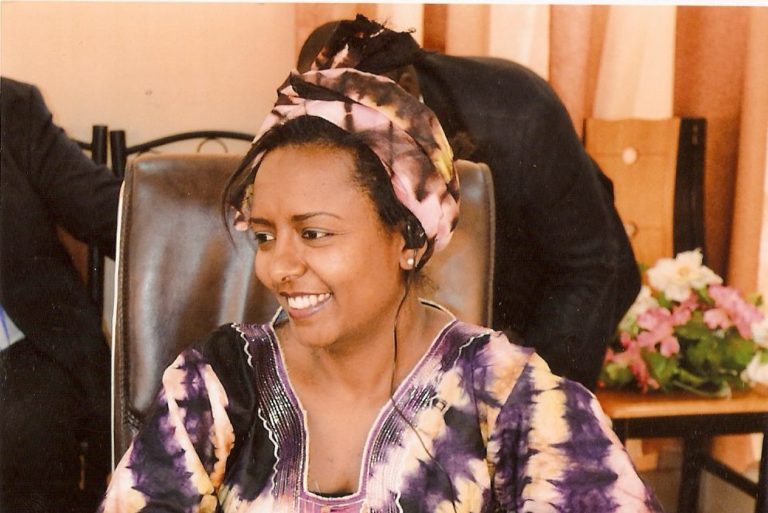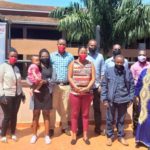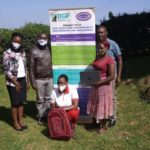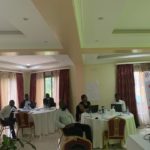Dear friends and colleagues,
Governments have a monopoly on the use of force so as to protect a social contract with its people. This monopoly, however, does not legitimise police brutality. Beatings, racial abuse, unlawful killings, torture, or indiscriminate use of riot control agents at protests are in violation of binding international human rights law.
This year has been filled with a lot of police brutality: the violent enforcement of COVID-19 measures in our sub-region, the brutal responses to Black Lives Matter protests worldwide or the violence ahead of elections in Tanzania and Uganda. In all these cases, the government has abused its monopoly and illegitimately disproportionate force.
This month has seen dramatic developments in Ethiopia’s Tigray region, with thousands of people displaced due to violence between government forces and rebel groups. I implore Ethiopia’s government, led by a Nobel Peace Prize winner nota bene, to remember that the social contract with its people may provide it with a monopoly on force, but not with a blank cheque to use that force.
Yours sincerely,
Hassan Shire
Executive Director, DefendDefenders
Human Rights Defender of the Month: Meskerem Geset Techane

Meskerem Geset Techane has fought injustice since she can remember: as a child she was known to stand up for herself and others, whether against bullies, teachers, her parents or church. Fighting injustice and promoting human rights is a common theme in the lawyer’s life. “It’s a passion, promoting human rights is not something you choose to do for a living or as a career opportunity. It’s more of a calling for me.”
A calling that has led Meskerem to impressive places. In Ethiopia, she served as a High Court Judge, worked as a pro-bono lawyer, and founded or spearheaded several civil society initiatives, most recently Lawyers for Human Rights and TIMRAN (She Leads). At the African level, she worked with African Union human rights bodies and African human rights lawyers. She initiated a continent-wide effort on human rights lawyering and strategic litigation. Meskerem is also active at the international level: she is currently a UN Human Rights Council’s distinguished Rapporteur mandate holder appointed with a global mandate in the UN Working Group on Discrimination against Women and Girls.
Did you know?
- That on 25 November, the International Day for the Elimination of Violence against Women, a global campaign called 16 Days of Activism Against Gender-Based Violence is launched? We are sharing the stories of victims of online gender-based violence with our #SayNoToOnlineGBV campaign on Twitter, Facebook, and Instagram.

Recommended reading:
- Bi-annual report: “ACHPR67: Updates from the East and Horn of Africa (May–November 2020)”, DefendDefenders, November 2020
Updates from DefendDefenders:
- DefendDefenders advocacy team took part in the annual HRCnet meeting which took place from 23-27 November;
- Together with CIVICUS, DefendDefenders prepared a joint report ahead of Rwanda’s Universal Periodic Review;
- DefendDefenders hosted a workshop from 26-27 November, for civil society organisations working on civil and political rights, to equip them with knowledge on the UPR process ahead of Uganda’s review in 2021;
- Together with AfricanDefenders, Encrypt Uganda, Women of Uganda Network, Digital Human Rights Lab, and Digital Literacy Initiative, DefendDefenders has created a campaign for 16 days of activism against gender-based violence (GBV). As part of our #SayNoToOnlineGBV campaign, we share testimonies every day for 16 days. The campaign will end on Human Rights Day, 10 December, with a workshop on digital security for victims of online GBV and the publication of a policy brief.
- From 9-13 November, DefendersTech conducted an online Ttaala capacity-building webinar, “The Digital Movement & the “New Normal,” to convey skills and inspiration to HRDs whose work is increasingly shifting online;
- DefendersTech conducted two organisational audits for two civil society organisations and held a strategic partner meeting with Uganda Law Society;
- In November, our protection team carried out five workshops and trainings; and
- DefendDefenders’ protection team received 39 requests for protection, of which 30 were approved, two rejected, three referred to like-minded organisations, and four remain pending.
Updates from AfricanDefenders:
- Together with partners, AfricanDefenders and DefendDefenders hosted a side event during the ACHPR67 on the State of Civic Space and Elections in Africa in the context of COVID-19;
- In November, AfricanDefenders engaged in several meetings to share experiences and best practices:
- Safe Havens Conference Global Stream 2020;
- Youth Dialogue on engagement with the Pan-African Parliament Youth Caucus;
- Annual meeting of the European Union Temporary Relocation Programme;
- Want to know what AfricanDefenders did in September and October? Check out their newsletter.
Human rights updates from the East and Horn of Africa sub-region:
Burundi
- On 20 November, a global campaign was launched to free HRD Germain Rukuki, a prisoner of conscience in Burundi.
- Burundi’s government ordered the office of the UN special envoy to shut down by end of the year. UN Secretary General Antonio Guterres urged to keep the office in operation for another year, due to the fragile situation.
Djibouti
- Djibouti’s only independent news source, La Voix de Djibouti, will be awarded Reporters without Borders’ (RSF) Prize of Courage.
Eritrea
- Eritrea ranked 7th worst African country to live in as a girl in African Child Policy Forum’s report.
Ethiopia
- On 4 November, Prime Minister Abiy Ahmed ordered a military intervention to engage with the Tigray People’s Liberation Front (TPLF). Mass casualties have been reported in different parts of Tigray, while thousands of Ethiopians have fled to neighbouring Sudan since last week. A six-month long state of emergency has been declared.
Kenya
- A Tanzanian opposition member was arrested in Kenya, after asking for asylum. Amnesty International has called on the Kenyan government not to deport him and respect international law.
- Since the onset of the COVID-19 pandemic, over 300 Kenyan journalists have lost their job, according to Reporters without Borders (RSF). Additionally, 73% of female journalists are highly likely to experience sexual harassment during assignments.
- Reporter Stephen Odour, was arrested after reporting on the resurgence of the outlawed Mombasa Republican Council (MRC) group. He was released following interventions from his employer, Nation Group Media.
- Kenya’s LGBTI+ community has faced increased attacks during the COVID-19 pandemic, with up to 10 reported attacks per month.
Rwanda
- Paul Rusesabagina, inspiration for the film Hotel Rwanda, is on trial on terrorism charges. He alleges to have been kidnapped from abroad, before being arrested and charged.
Somalia/
Somaliland
- Astaan TV owner and CEO Abdimanan Yusuf was sentenced to five years in prison and a fine, without giving any grounds. He had been in custody since July. His popular TV channel has been suspended indefinitely. Rights groups and media houses fear for press freedom ahead of the upcoming election season.
South Sudan
- The Committee to Protect Journalists has called on South Sudanese authorities to immediately release journalists Zechariah Makuach Maror and Jackson Ochaya and halt all acts of intimidation against the press.
Tanzania
- At least four people were killed in relation to Tanzania’s 30 October elections, according to Human Rights Watch. Together with Amnesty International, they are urging for credible investigations into these killings and other election-related abuses. They are calling for these repressive practices to end.
Uganda
- On 18 November presidential candidate Robert Kyagulanyi (known as Bobi Wine), was arrested, ahead of a planned campaign rally for allegedly contravening COVID-19 regulations. The news sparked protests which was met with live ammunition: in three days at least 45 people were killed, dozens injured, and over 800 arrested. Another opposition presidential candidate, Patrick Oboi Amuriat, was arrested twice in two days in Gulu. Police violence has increased rapidly since the presidential campaigns formally started and Uganda’s press is experiencing a crackdown.
- Ugandan Trans activist Chris Lordson was awarded the prestigious Canadian Steinert and Ferreiro Award.




